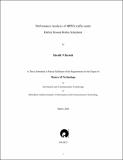| dc.contributor.advisor | Jotwani, Naresh D. | |
| dc.contributor.author | Bavishi, Hardik N. | |
| dc.date.accessioned | 2017-06-10T14:36:54Z | |
| dc.date.available | 2017-06-10T14:36:54Z | |
| dc.date.issued | 2004 | |
| dc.identifier.citation | Bavishi, Hardik N. (2004). Performance analysis of MPEG traffic under deficit round Robin Scheduler. Dhirubhai Ambani Institute of Information and Communication Technology, xi, 71 p. (Acc.No: T00029) | |
| dc.identifier.uri | http://drsr.daiict.ac.in/handle/123456789/66 | |
| dc.description.abstract | The use of network multimedia applications like Video Conferencing and Video-on-Demand is likely to increase tremendously in future. Bandwidth, delay and delay variation are important performance parameters in such multimedia applications. The multimedia traffic, typically bursty in nature, can be represented by MPEG traffic. MPEG being one of the most popular video-encoding standards, the MPEG traffic will have to be very carefully handled by the network so as to satisfy its performance requirements. Scheduling is a key mechanism in packet-switching networks. Performance achieved by an application depends on how its traffic is treated along its path through the network. When packets of traffic belonging to an application are waiting for transmission at an intermediate node, the scheduler at the node decides their order of transmission. During congestion, the scheduler decides which packets to drop. Thus the scheduler decides how the network resources (link bandwidth and buffer space) are shared among the flows. Fair schedulers are those, which allow fair sharing of these resources among the flows. Deficit Round Robin (DRR) is one such popular and efficient fair scheduler. The main performance parameters of interest are delay and delay variation. We identify and define the factors that impact performance achieved by a flow under DRR. We design simulation experiments based on the identified factors to understand and analyze the effects of the factors on performance. Based on this we analyze performance of the MPEG traffic under DRR scheduler in presence of best-effort traffic. DRR++ is a modification of DRR to handle bursty latency critical traffic preferentially in the presence of the best-effort traffic. We also obtain similar simulation results for DRR++ to understand the improvement in performance achieved by the MPEG traffic. | |
| dc.publisher | Dhirubhai Ambani Institute of Information and Communication Technology | |
| dc.subject | MPEG | |
| dc.subject | Robin Scheduler | |
| dc.subject | Video coding standard | |
| dc.subject | Video compression | |
| dc.classification.ddc | 621.388 BAV | |
| dc.title | Performance analysis of MPEG traffic under deficit round Robin Scheduler | |
| dc.type | Dissertation | |
| dc.degree | M. Tech | |
| dc.student.id | 200211038 | |
| dc.accession.number | T00029 | |

